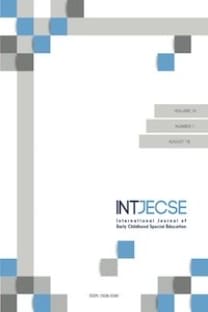The challenges of itinerant early childhood special education: The perspectives of practitioners
Öz ECSE teachers who serve as itinerants face professional challenges that can differ from their classroom-based colleagues. The purpose of this study was to understand the kinds of challenges that itinerant ECSE teachers from one state face. A content analysis of comments related to professional challenges yielded six themes that focused on logistics, caseload, confidence and competence, characteristics of teachers, parents, or early childhood programs, accessing resources and professional support, and meeting the needs of specific children. Most of the comments centered on the characteristics of teachers, parents or early childhood programs. Implications for future research include the need for replication with other groups of itinerant teachers. Implications for practice focus on the need to better prepare ECSE teachers for roles as itinerants.
Anahtar Kelimeler:
consultation, coaching, early childhood inclusion, itinerant services
___
Artman-Meeker, K. M., & Hemmeter, M. L. (2013). Effects of training and feedback on teachers’ use of classroom preventive practices. Topics in Early Childhood Special Education, 33(2), 112-123. doi: 10.1177/0271121412447115Barnett, W. S., Carolan, M. E., Fitzgerald, M. J., & Squires, M. J. H. (2012). The state of preschool 2012. National Institute for Early Education Research, 6.
Bredekamp, S. (1993). The relationship between early childhood education and early child-hood special education: Healthy marriage or family feud? Topics in Early Childhood Special Education, 13(3), 258-273. doi: 10.1177/027112149301300305
Buysse, V., West, T., & Hollingsworth, H. (2009). Why program quality matters for early childhood inclusion: Recommendations for professional development. National Professional Development Center on Inclusion. (ERIC Document Reproduction Service No. ED530291).
Chang, F., Early, D.M., & Winton, P. J. (2005). Early childhood teacher preparation in special education at 2- and 4-year institutions of higher education. Journal of Early Intervention, 27, 110-124. doi: 10.1177/105381510502700206
Clough, P., & Nutbrown, C. (2004). Special educational needs and inclusion: Multiple perspectives of preschool educators in the UK. Journal of Early Childhood Research, 2(1), pp. 191 – 211. doi: 10.1177/1476718X04043015
Dinnebeil, L. A., & McInerney, W. F. (2011). A guide to itinerant early childhood special education services. Baltimore, MD: Brookes Publishing Company.
Dinnebeil, L. A., McInerney, W. F., Roth, J., & Ramaswamy, V. (2001). Itinerant early child-hood special education services: Service delivery in one state. Journal of Early Intervention, 24(1), 35-44. doi: 10.1177/105381510102400106
Dinnebeil, L., McInerney, W., & Hale, L. (2006). Understanding the roles and responsibilities of itinerant ECSE teachers through Delphi research. Topics in Early Childhood Special Education, 26 (3), 153-166. doi: 10.1177/02711214060260030301
Downer, J. T., Locasale-Crouch, J., Hamre, B., & Pianta, R. (2009). Teacher characteristics associated with responsiveness and exposure to consultation and online professional development resources. Early Education and Development, 20(3), 431-455. doi: 10.1080/10409280802688626
Early, D. M., & Winton, P. J. (2001). Preparing the workforce: Early childhood teacher preparation at 2-and 4-year institutions of higher education. Early Childhood Research Quar-terly, 16(3), 285-306. doi: 10.1016/S0885-2006(01)00106-5
Fox, L., Hemmeter, M. L., Snyder, P., Binder, D. P., & Clarke, S. (2011). Coaching early childhood special educators to implement a comprehensive model for promoting young children’s social competence. Topics in Early Childhood Special Education, 31(3), 178-192. do: 10.1177/0271121411404440
Fyssa, A., Vlachou, A., & Avramidis. E. (2014). Early childhood teachers’ understanding of inclusive education and associated practices: Reflections from Greece. International Journal of Early Years Education, 22(2), 223-237. doi: 10.1080/09669760.2014.909309
Grace, R., Llewellyn, G., Wedgwood, N., Fenech, M., & McConnell, D. (2008). Far from ide-al: Everyday experiences of mothers and early childhood professionals negotiating an inclusive early childhood experience in the Australian context. Topics in Early Childhood Special Education, 28(1), 18-30. doi: 10.1177/0271121407313525
Harris, A. M., & Cancelli, A. A. (1991). Teachers as volunteer consultees: Enthusiastic, will-ing, or resistant participants? Journal of Educational and Psychological Consultation, 2(3), 217-238. doi: 10.1207/s1532768xjepc0203_2
Johnson, L. J., Pugach, M. C., & Hammitte, D. J. (1988). Barriers to effective special education consultation. Remedial and Special Education, 9(6), 41-47. doi: 10.1177/074193258800900609
Krippendorff, K. (2012). Content analysis: An introduction to its methodology. Thousand Oaks, CA: Sage.
Maxwell, K.L., Lim, C-I, & Early, D.M. (2006). Early childhood teacher preparation programs in the United States: National Report. Chapel Hill, NC: The University of North Carolina, FPG Child Development Institute
Mitchell, A. (2009). Quality rating and improvement systems as the framework for early care and education system reform. Retrieved from http://buildinitiative.org/WhatsNew/ViewArticle/tabid/96/smid/412/ArticleID/496/Default.aspx
Odom, S.L., & Diamond, K.E. (1998). Inclusion of young children with special needs in early childhood education: The research base. Early Childhood Research Quarterly, 13, 3–26. doi: 10.1016/S0885-2006(99)80023-4
Region 1 Office of Child Care and the National Infant and Toddler Child Care Initiative (2011). A guide to effective consultation with settings serving infants, toddlers, and their families: Core knowledge, skills, and dispositions. Washington, DC: U.S. Department of Human Services, Administration for Children, Youth and Families.
Sheridan, S. M., Clarke, B. L., Knoche, L. L., & Pope Edwards, C. (2006). The effects of conjoint behavioral consultation in early childhood settings. Early Education and Development, 17(4), 593-617. doi: 10.1207/s15566935eed1704_5
Zellman, G.L. & Perlman, M. (2008). Child-care quality rating and improvement systems in five pioneer states: Implementation issues and lessons learned. Santa Monica, CA: RAND Corporation, http://www.rand.org/pubs/monographs/MG79.
- ISSN: 1308-5581
- Başlangıç: 2009
- Yayıncı: İbrahim H. DİKEN
Sayıdaki Diğer Makaleler
Zsófia BÖDDİ, Mónika SERFŐZŐ, Zsuzsa F. LASSÚ, Valéria KEREKES
Parents’ ideal type approaches to early education pathways: life stories from Sweden.
Margareta SANDSTRÖM, Johanna LUNDQVİST, Annika AXELSSON
Mehmet Seckin GEZER, Veysel AKSOY
Activity-Based Intervention to Support Second Language Acquisition.
The challenges of itinerant early childhood special education: The perspectives of practitioners
Laurie A. DINNEBEIL, Gwen WEBER, William F. MCINERNEY
Multi-component professional development for early interventionists.
